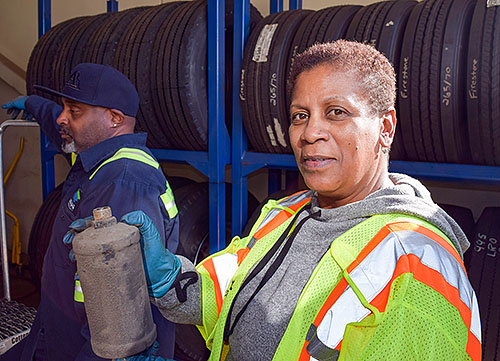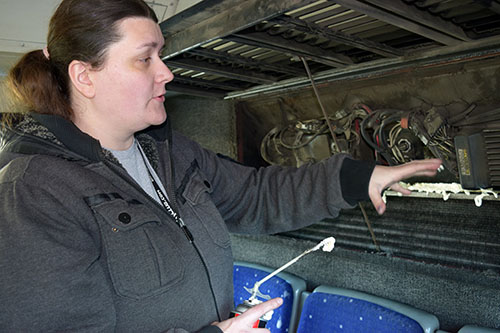Engines and transmissions may be critical to a well-functioning transit bus, but few systems can compete with HVAC for meeting the creature comfort needs of operators and customers.

People naturally don’t think much about HVAC until it’s hot and muggy during the summer or freezing cold outside, and then they expect cool/hot air to rush out at the push of a button. And when it doesn’t, customers light up the phones at Customer Relations. Operators are not too happy, either.
Keeping those systems ready for service is a never-ending challenge for the Operations Department where training to maintain AC systems was underway even though the temperature outside was a balmy 30 degrees.
“It’s never too early to start working on these systems,” said Tara Puckett, a training specialist in Operations who has been heading up a training effort to get more mechanics schooled on the best practices for HVAC maintenance.
HRT has worked at maintaining these systems for years, but it has not always had the best results because of training deficiencies and a high mechanic turnover rate. Some mechanics did their best with minimal training, while others who were more experienced HVAC mechanics were often overwhelmed with the high demand for repairs and never could quite get ahead.
The results were not as consistent as anyone would have liked. The effect: buses with spotty HVAC systems, muggy in summer cold in the winter.
The latest approach uses a data-driven process that holds the promise of keeping some of the older units operating as designed. Training is underway to ensure that customers will have plenty of cool air in the summer and hot air in the winter.
We did a trend analysis to look at all road calls from last summer. We were looking for common problems. In Hampton, we found the 1200 series buses (dating back to 1999) had most of the road calls for HVAC, so we are bringing those in first. The South Side saw most of its road calls from buses received in the early 2000’s.
— Kirk Smith, North Side Bus Superintendent
The research showed that air driers – a device that keeps moisture out of air conditioning systems – were not being changed frequently enough to compensate for the high demand put on the systems. The research also showed that many seals that protect refrigeration lines from rubbing against bulkheads had deteriorated and were in need of replacement. Some of these, in fact, were simply corroded beyond repair, increasing the chances that lines would rub against metal bulkheads and spring leaks.

“We have had HVAC campaigns before, but I really believe in this one,” said Smith. “I think we will see a big difference this year. I really believe in this program and have seen positive results in the buses that we have already completed.”
Previous efforts, he said, were “vague” and relied too much on the judgment of prior training/experience which can vary from one mechanic to another. The new process is more precise and forces mechanics to perform step-by-step reviews of AC systems in accordance with new HRT standard operating procedures that are designed to help mechanics not overlook anything.
In the latest training class, Puckett lead a team of mechanics through the maintenance procedure that involved cleaning the coils, changing filters and sealing gaps in the system that allowed air to be improperly managed.
Larry Hill, a North Side mechanic, said he liked the program because it not only identified problems but provided specific guidance on how to fix them. In addition, he said, the new program helps mechanics understand the basic operating concepts of HVAC – an important step to helping mechanics do a better job.
To date, over 50% of all mechanics have received the HVAC refresher training with more classes scheduled in the next few months. Since the HVAC campaign started in the middle of January, six of the 284 buses have been completed with many more in progress.